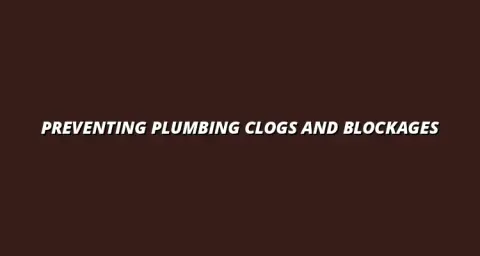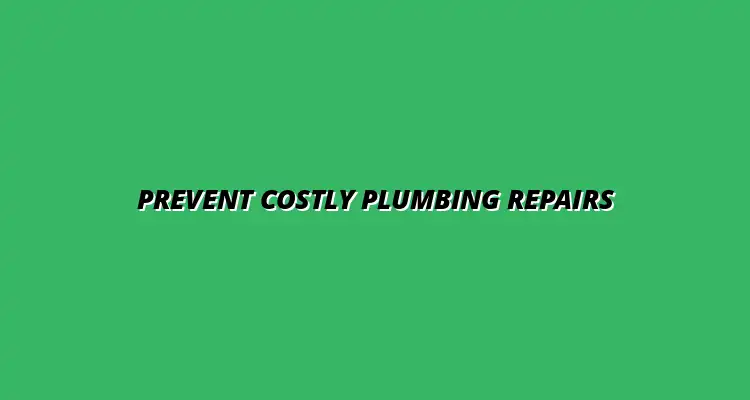
- Plumbing Basics
- Feb 14
2025-02-12
Keeping your plumbing in top shape is not just about fixing leaks or unclogging drains. It’s about ensuring that all components work smoothly, which can help save you money and prevent major headaches down the road. Here, we will explore some essential plumbing maintenance techniques that can keep your home running efficiently.
Regular maintenance is crucial because it helps identify problems before they escalate. By taking a proactive approach, you can not only extend the life of your plumbing systems but also avoid costly repairs. Let's dive into why this is so important!
Ignoring plumbing maintenance can lead to expensive repairs. This is why it’s vital to understand the importance of maintaining your plumbing system on a regular basis. A few simple checks can save you from significant issues later!
When you take care of your plumbing, you're not just protecting your home; you're also making your life easier. Regular maintenance helps prevent emergencies, giving you peace of mind! For more beginner-friendly tips, check out these home plumbing safety tips for beginners.
Taking a proactive approach to plumbing maintenance can lead to several financial benefits. Consider the following:
By investing time in routine maintenance, you can ultimately save money over time. It’s a win-win situation!
When small problems go unnoticed, they can grow into bigger issues. For example, a tiny leak can lead to mold growth or water damage. Understanding this progression is vital for any homeowner.
Here are some common ways plumbing problems can escalate:
Being aware of these potential escalations can motivate you to check your plumbing regularly!
As a homeowner, it’s essential to have a few key plumbing tips in your toolkit. Regular checks and proactive measures can prevent many common plumbing issues. Let’s go over some simple yet effective tips!
By understanding and implementing these tips, you can keep your plumbing systems in great shape. Learn more about general plumbing system maintenance with these helpful tips for plumbing system maintenance. After all, prevention is always better than cure!
Conducting routine inspections is crucial for identifying potential plumbing problems before they worsen. Here are some simple steps you can take:
Regular inspections can help catch issues early, saving you from more significant repairs later!
Monitoring your water pressure is another important aspect of plumbing maintenance. High or low water pressure can lead to various plumbing issues. Here’s why you should pay attention:
By regularly checking your water pressure, you can address any issues before they turn into major problems!
Knowing the common plumbing problems that can arise in your home is essential for prevention. By understanding how to prevent these issues, you can save yourself time and money. Let’s look at some of the most frequent plumbing problems and how to avoid them!
Taking preventive measures can significantly reduce the likelihood of plumbing emergencies. For example, learn how to prevent pipe corrosion here. Here are some crucial insights!
Leaky faucets and pipes are among the most common plumbing issues. They can waste a lot of water and lead to bigger problems if not addressed. Here are some causes and solutions:
By addressing these problems promptly, you can keep your plumbing system in excellent condition! Learn how to fix a leaky faucet yourself.
Clogged drains can be a nuisance and may lead to serious plumbing issues. Implementing effective prevention strategies can help keep your drains clear. Here are some tips:
By following these strategies, you can significantly reduce the risk of clogged drains in your home! See additional tips on preventing bathroom drain clogging year-round.
Seasonal changes can impact your plumbing systems. By being aware of these changes, you can better prepare your plumbing for various weather conditions. Here are some essential seasonal tips!
Taking the time to adjust your plumbing maintenance according to the season can help prevent damage and costly repairs!
Winter can be tough on plumbing systems. To avoid frozen pipes and other cold-weather issues, consider these tips:
Preparing your plumbing for winter can save you from unexpected disasters!
Spring is a perfect time to tackle plumbing maintenance tasks. Here’s a checklist to help you get started:
By focusing on these tasks during spring cleaning, you can maintain a healthy plumbing system year-round! Don't forget your water heater; check out this water heater maintenance checklist.
Smart technology can play a significant role in maintaining your plumbing systems. With the advancements in technology, homeowners can now monitor and manage plumbing issues more efficiently. Let’s explore how smart devices can help!
Incorporating these technologies can lead to significant savings and peace of mind. It’s an exciting time to take advantage of these innovations!
Smart devices can help in detecting plumbing issues early. Here are some ways they can assist you:
By utilizing smart technology, you can stay ahead of plumbing issues!
Technology continues to evolve, offering innovative solutions for plumbing management. Here are some advancements that can benefit homeowners:
Embracing these advancements can lead to improved efficiency and convenience in your plumbing systems!
Maintaining the health of your plumbing systems is crucial for avoiding costly repairs down the line. One way to achieve this is by establishing a consistent plumbing maintenance schedule. By being proactive and keeping up with regular tasks, you can catch small issues before they blossom into major problems.
Also, having a set schedule will help you stay organized and ensure that nothing is overlooked. Creating a timeline for inspections and maintenance tasks will set you on the right path to a healthy plumbing system. For help with local plumbing needs, consider contacting a plumber in Alcester, Birmingham.
Having a detailed schedule makes it easy to manage your plumbing tasks efficiently. Start by determining how often you will check various parts of your plumbing system. This can be monthly, quarterly, or annually, depending on your needs and local conditions.
Additionally, consider documenting these checks. This will not only keep you accountable but also help identify any recurring issues. A checklist is a handy tool that can guide you through the maintenance process.
Checklists can be invaluable for keeping your plumbing in top condition. They help ensure that no tasks are missed during inspections. You might want to create separate checklists for monthly, seasonal, and annual tasks.
By following a checklist, you can easily track your plumbing maintenance efforts and keep your system running smoothly. Plus, these lists make it easier to visualize what needs to be done.
Establishing a budget for plumbing maintenance is essential for long-term care. This budget should include both routine maintenance costs and unexpected repairs. Allocating funds specifically for plumbing can prevent you from being caught off guard later.
By being financially prepared, you can tackle plumbing issues without stress. A little investment in maintenance goes a long way in protecting your home!
There are times when DIY efforts simply won't cut it, and it's important to recognize these moments. Knowing when to call a professional can save you a lot of hassle and potential damage. Some signs might not be obvious, but they signal that it's time for expert help.
Look for signs like persistent leaks, discolored water, or unusual noises from your plumbing system. These can indicate issues that require specialized tools and know-how.
Knowing the right signs can help you decide when to call in the pros. Here are some common indicators:
If you notice any of these signs, don’t hesitate to reach out to a qualified plumber. It's better to be safe than sorry when it comes to plumbing issues!
Regular professional inspections offer numerous benefits. They can catch potential problems early, often saving you money in the long run. Inspections can also help identify issues you might overlook during routine maintenance.
Investing in professional inspections can enhance the longevity of your plumbing system overall. It’s a smart choice for homeowners who want to avoid surprise repairs!
To wrap up, maintaining your plumbing system is an ongoing commitment. By sticking to the strategies we've discussed, you can significantly reduce the chances of unexpected repairs. Remember, prevention is always better than a fix!
Let’s summarize some key tips for plumbing maintenance:
By incorporating these tips, you’ll be well on your way to maintaining your plumbing effectively!
Encouraging proactive measures within your household can create a culture of maintenance. Share your knowledge with family members or roommates, and make plumbing care a shared responsibility. This teamwork can motivate everyone to take plumbing seriously!
Getting started on your plumbing maintenance journey is easier than you think! Simply gather the tools you need, create your checklists, and set up a schedule. Once you initiate this process, you’ll be amazed at how much smoother your plumbing issues can become.
Let’s keep our homes safe and sound—begin your plumbing maintenance today!
